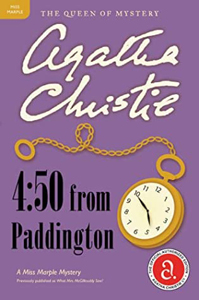Agatha Christie’s “4:50 from Paddington” (1957, also published as “What Mrs. McGillicuddy Saw!”) is outfitted with a lot of the tropes we enjoy. Miss Marple solves the case from a living-room chair (although she goes to a friend’s house in the vicinity of the murder to do so, like it’s a leisure activity). Adult sons and daughters fret over an old curmudgeon’s savings. And ultimately, I did not come close to guessing whodunit.
Do we love Lucy?
These are typical, enjoyable Christie elements. What makes “Paddington” different is it moves slowly through its 262 pages. After Marple’s friend Mrs. McGillicuddy sees a murder on a train on her Christmas-shopping jaunt, Marple surmises the body was dumped at the large estate along the tracks, Rutherford Hall.
Then we focus on residents and servants at that estate, and it’s up to Marple and her charge, Lucy Eyelesbarrow, to solve the case. Police won’t believe there was a murder until there’s a body.

“4:50 from Paddington” (1957)
Also published as: “What Mrs. McGillicuddy Saw!”
Author: Agatha Christie
Genre: Mystery
Series: Miss Marple No. 7
Setting: Brackhampton, England, 1957
Lucy is at first an interesting focal character. She’s essentially a logistics expert. She takes short-term servant gigs – perhaps assisting a rich family on a vacation with many stops — and commands high rates because she’s so good at it. She’s so flush with cash that she takes a low-paying gig with the Crackenthorpes for the chance to solve a murder.
New money motives
Christie has always been interested in money as a motive to murder, but in her mid-career novels she gets more nuanced. Taxes were apparently on the rise in England at this time, so that factors into people’s financial decisions and murder motives.
Inheritors of wealth can apply their money in ways where it will or will not be taxed. Developing land might help a person hold onto their wealth better than keeping it in cash form.
Rutherford Hall itself speaks to the encroachment of city limits on country manors at the time. The estate was once a farm and ranch – a food product developed by the previous generation is the reason for the Crackenthorpes’ established wealth – but now it’s basically a ruin.
Christie is unamused by taxation, but she seems dryly amused by people’s obsession with it. She doesn’t take a strong position on urban sprawl. She goes with the flow on that one.
Stock suspects
Emma Crackenthorpe is a direct contrast to Lucy: She’s tied down to Rutherford Hall because she has to take care of that aforementioned curmudgeon, her father Luther. He’s supposedly an invalid, but really he just likes bossing people around.
Christie has written many unlikable old patriarchs, but Luther is a parody of the role. He’s actually gleeful when one of his sons is murdered. At this point, his behavior crosses the line from amusing to shocking. I found it hard to accept him as a real person.

Emma’s three brothers are stock Christie characters. All are rather pathetic because they make Emma do all the caring for the father (although it’s understandable why they don’t want to). One is a ne’er-do- well artist, one is a mediocre-to-bad businessman, and I forgot what the other one does.
There’s also Luther’s son-in-law, the widower of a deceased daughter. He’s such a sad sack that his own son calls him by his first name.
Before the whodunit, a ‘who-is-it’
Part of why the book is longer than average is its “pre-mystery.” Who is the woman on the train? Marple and Lucy (posing as her niece), along with the official investigators, want to solve whodunit. But they can’t get far until they figure out who the victim is.
The solution relies on a coincidence. But I was pleasantly taken off guard by the resolution. And Marple’s shushing of a colleague at a confession scene shows that she can think on her feet. Her skills go beyond slowly putting pieces together while crocheting.
“Paddington” is halfway between an expert-level mystery (where Marple solves it) and amateur-level (where the reader’s stand-in solves it). It’s amusing how Marple drops clues to Lucy to help her (and us).
Christie briefly hits a vein of comedy when almost all the Crackenthorpe men propose marriage to Lucy in one day. But “Paddington” has an overall coldness, like the author was in a bad mood while writing it. Even Marple hopes that the killer will hang.
As much potential as Lucy and some others have, they don’t quite become memorable. “4:50 to Paddington” gets a reader to the destination, but we’re not riding in first class this time.
Every week, Sleuthing Sunday reviews an Agatha Christie book or adaptation. Click here to visit our Agatha Christie Zone.

